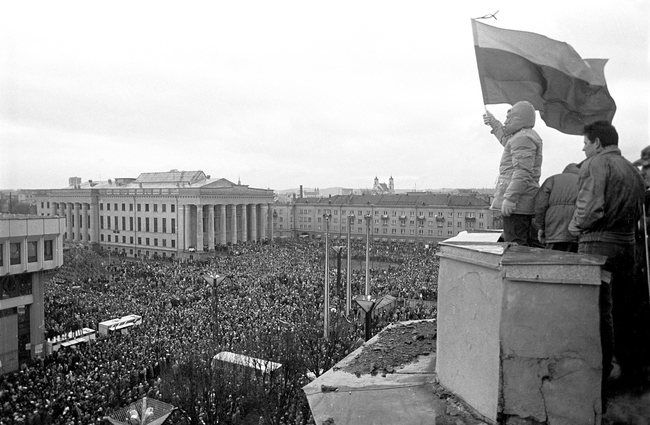An essentially tragic event, which in fact catalyzed the final collapse of the Soviet Union, was marked recently. On January 13, 1991, citizens of Lithuania surrounded the Vilnius TV center to prevent it from being seized by the Soviet military. This left 14 people dead, about 700 wounded, and 3,000 otherwise affected. In spite of the tragedy and casualties, this day is extremely important for present-day independent and democratic Lithuania. “It is struggle and heroism that the current generation of Lithuanians associates this date with,” the German Deutsche Welle quotes Arvydas Anusauskas, a Lithuanian historian and member of the Lithuanian Seimas’ national security and defense committee, as saying.
That event also brings to mind an incredible solidarity on the part of the oppositional milieu in all the Soviet republics, including Russia. “Firstly, Lithuanians rose up. Secondly, they received support from Russia, above all in Moscow,” Radio Liberty’s Moscow journalist Mikhail Shevelyov writes on his Facebook page. “One of the most mass-scale demonstrations in Soviet and post-Soviet history took place in January 1991 on Manege Square. Three hundred thousand people… Were those people so much concerned about Lithuania’s destiny and independence? Perhaps they were. But they also felt that it was about their own destiny and hopes for a different life – about the self that always comes first: tanks will crush Lithuanians today and all the others tomorrow. And they achieved their goal – tanks failed to seize Vilnius.”
Today, 25 years on, when the Heavenly Hundred was killed in Kyiv and 8,000 Ukrainians died as a result of Russia’s aggression in the Donbas, we can no longer see mass-scale 300,000-strong solidarity actions on the part of Russians. All we can see is scorn, condemnation, and the fact that 85 percent of the population is satisfied with President Putin’s policy.
What has happened to our eastern neighbors? Why have they changed? Why do the Ukrainians only see and hear scorn and jeers, instead of sympathy and resolute attempts to stop the Kremlin’s mad policies, from the Russians? Has the feeling of solidarity and their own dignity abandoned the Russians?

VILNIUS, LITHUANIA. JANUARY 13, 1991 / Photo from the website 15MIN.LT
“THE RUSSIAN PEOPLE HAVE ALWAYS BEEN INFECTED WITH THE VIRUS OF IMPERIALISM AND CHAUVINISM”
Yurii SHCHERBAK, writer, diplomat:
“I can remember January 13, 1991 very well because I was in Moscow at the time as member of the USSR Supreme Soviet and the oppositional Inter-Regional Parliamentary Group. When Lithuania’s representative came to our meeting, he told us about the tragedy in Vilnius. We went out onto the streets of Moscow in protest against the Soviet leadership’s imperial policies. It was clear that Gorbachev had staked on the Soviet reactionary forces, although the latter in fact overthrew him later.
“It was a powerful demonstration of unity with Lithuanians and other enslaved peoples. We still remembered the Tbilisi events and the threats to use military force in various USSR republics. Those events stirred up the entire oppositional milieu, and, since then, we have never seen solidarity of the kind that Russian oppositionists showed at the time.
“Later, the Russians began to show more and more signs of great power chauvinism and Russian arrogance, and lay claims to dominating over all the peoples that formed the Soviet Union. The Russian people have always been infected with the virus of imperialism, which dates back not only to the Soviet era, but also to the times when Moscow was forming a doctrine of an exceptional and messianic ‘third Rome.’ All this has been hammered into Russian minds for centuries on end. And when communism, which had brought countless sorrows to all the USSR peoples, received the first blow, the process of democratization somewhat subdued the imperial virus. Unfortunately, the feeling of a ‘historic defeat’ in the struggle for worldwide domination came over the Russian ruling elite that consisted of revenge-seeking politicians, security officers, and the military. The motifs of a ‘defeat’ were also embracing the broad masses. The perestroika resulted in a dramatic fall of the living standards and a terrible political and economic crisis in the whole post-Soviet space. The populace was disappointed with democratic slogans and scanty democratic gains. Thus the bandit-style idea of supremacy over all the USSR peoples and the ‘big-brother ideology’ got the upper hand.
“But the winter of 1991 saw the springtime of oppositional forces. That was a very portentous event, which deserves to be remembered 25 years later. I am sure there will be a time when democracy and common sense will begin to gain strength in Russia again. We expect the Russians to turn to Ukrainian problems first of all and offer apologies to the people of Ukraine.”
“THE KREMLIN’S ACTIONS ARE ALSO DESTROYING RUSSIA ITSELF”
Lauras BIELINIS, political scientist, Vilnius:
“I think there is only one factor that caused the Russians to change: a quarter of a century ago, people were sure they could obtain any information in line with their interests and persuasions. It was not closed – it was variegated and topical. This is why very many people supported Lithuania in 1991, when, 25 years ago, glasnost gave them an opportunity to take to the streets.
“The population of Russia is very varied, so I think there are a lot of people even now who think in the categories of democracy but keep silent. The whole problem is that there are no conditions for glasnost in today’s Russia – people can only receive biased and politically tendentious information, which not so much provides opportunities for impartial knowledge of the situation inside the country and abroad as defends the position of the Kremlin bosses’ regime. In the past decade, the Kremlin’s ruling regime has been deliberately and systematically building a propagandist system that prompted people to take an imperial-style attitude to the essence and importance of Russia and a somewhat scornful view of its neighbors which are not regarded as full-fledged states, nations, and communities. These politically tendentious actions are also in fact destroying Russia itself.
“So, we can draw a clear conclusion: as long as there is no openness in Russia, the populace is not receiving information about everything, and people are not in a position to speak openly and boldly, we will see them keeping silent. I don’t think there is a regime or a situation that cannot change. Therefore, reversal changes in Russia are also possible under the influence of economic and sociopolitical factors, for the growing tension in that country is not in favor of the ruling elite. All this is accumulating, and I don’t think we will have to wait for another 70 years to see a new revolutionary or evolutionary change there – things will be unfolding much faster.”
“THERE ARE MUCH MORE CHANCES TO BE A VOICE OF FREEDOM UNDER COMMUNISM THAN UNDER POST-COMMUNISM”
Lilia SHEVTSOVA, senior fellow, Brookings Institution:
“The problem is with the Russian intelligentsia. The intelligentsia ceased to exist as a social group of sorts when the USSR collapsed. But even in the USSR, this stratum played a dual role: a voice of dissent and protest, on the one hand, and a servant to the government, on the other.
“In the years of post-communism, the intellectual stratum has been demoralized. It failed to become a symbol or a mouthpiece of values or of resistance to the upcoming authoritarianism. It turned out that there are much more chances to be a voice of freedom under communism than under post-communism, when all principles began to be simulated and cynicism became all-pervasive. Accordingly, transition to freedom is far more difficult in the times of post-communism than in the times of communism.”
“The intellectual stratum is today in a situation of disunity and loss of vector, it has succumbed to the imperial drug – this drug has proved to be efficacious. It turned out that time and propaganda had managed to arouse something abysmal and ruinous in the hearts of many. The fact that a part of intellectuals proved to be Soviet-minded is a serious problem for our future.
“But this does not apply to absolutely all! The voices of those who have adopted an imperialist mentality are easy to hear because they speak out from all the open sources. Yet if you read social websites, you will see many of those who resist the ‘drug.’ So, it will be an exaggeration to claim that the entire society has turned into ones who depend on the imperial dope.”








